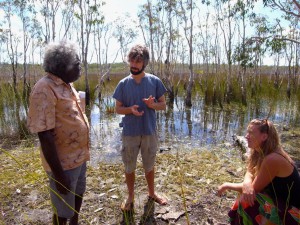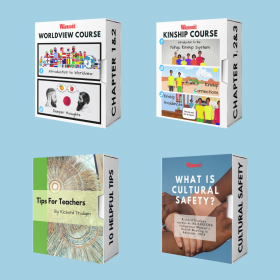Process or, “how you get there“, is more important than your destination.
When good process is applied the people help us determine the destination. That destination might be very different to what we thought it would be.

The methodology is how to do things, not what you do. For example, in community consultation, it is not what you will ask or the order that you ask it in that is important. Through a good methodology, it is how you will form the questions and then how you will ask the questions that is important.
A good methodology is required to establish an empowering, engaging, and diplomatic process to implement solutions, solutions that the community and its people will own. However, because process is SO important to engage human participation, in many ways the methodology, “how we do it”, then becomes the solution.
Here’s a summary of how we do things:
Capacity Building fundamentals
- Communicating in the People’s language and worldview creates real understanding and empowerment for the people
- Participating as equals in the learning process empowers learners and advances mutual understanding
- Working with whole communities through traditional leaders and social structures enables the whole community to learn, critique, reinforce and support each other when learning new information
- Using the discovery education model for adults makes it possible for all the people to investigate, ask all questions they have, and understand what they want and need to know about the subject
- Use the academic language of the traditional educators in education programs so there is, deep intellectual understanding, elders are respected and the generation gap between old and young community members is closed
Research
- Discover ‘knowledge gaps’
- Discover any areas of mystification or confusion
- Discover and use culturally appropriate terms and concepts that generate understanding within the intellectually rich Indigenous cultural world-view
- Try, reflect, refine, and try again (the process of praxis)
Empower
- Respect traditional Yolŋu ways of doing things
- Give the Yolŋu people answers to the questions they want answers to
- Use competent and complete content, not simplistic messages and slogans
- Create cohesive well-functioning communities by providing all Yolŋu people with equal access to information, knowledge and education
- Follow the agenda of the people (or your client/s), but with a critical dialogue as a peer (ie. help people explore and critique the issue).
Resource Development
- Produce intellectually competent and culturally appropriate information resources for Yolŋu so they have equal access to mainstream knowledge, news and social and technological developments
- Develop radio and web-based information and communication services, modern resources in the birth language of the local adults, available to the great majority.
- Support language resources development that target literacy and cross-cultural competency in the deep conceptual terms. eg. Dictionaries for major professions, Indigenous language to English literacy learning tools
Read an independent evaluation of our resources by PriceWaterhouseCoopers’ Indigenous Consulting business (PIC) carried out October 2020: Why Warriors_Program_Evaluation_Final.


